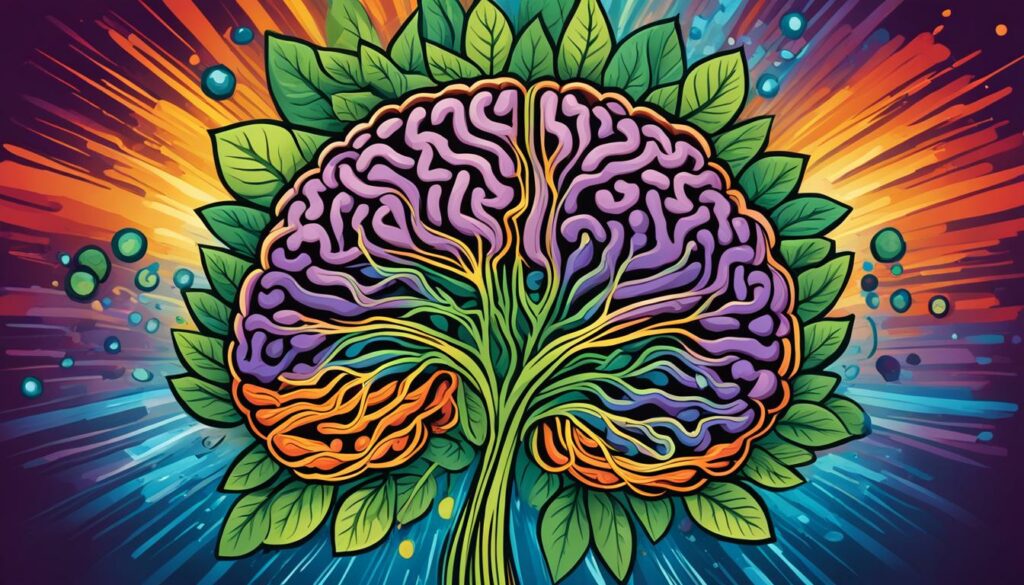Welcome to our comprehensive guide on the numerous benefits and uses of ashwagandha for holistic wellness. Ashwagandha, also known as Indian ginseng, is a powerful herb that has been utilized in Ayurvedic medicine for centuries.
Are you looking to reduce stress, improve sleep quality, boost your energy levels, enhance cognitive function, manage depression, support your immune system, or achieve hormonal balance? Ashwagandha might be the answer you’ve been searching for!
In this article, we will delve into the research-backed benefits and potential uses of ashwagandha in detail. Whether your goal is to experience relief from anxiety and stress, enjoy better sleep, enhance cognitive performance, or achieve overall wellness, ashwagandha could be the natural solution you’ve been seeking.
Ashwagandha for Stress and Anxiety
Ashwagandha, an adaptogen, is an ancient herb that can help your body cope with stress, alleviating anxiety symptoms. Research suggests that ashwagandha supplements have the potential to reduce stress and anxiety by lowering cortisol levels and improving sleep quality.
Several studies have shown positive effects of ashwagandha on perceived stress, anxiety, and overall well-being. By incorporating ashwagandha into your daily routine, you may experience a calming effect, helping you manage stress and anxiety more effectively.
“Ashwagandha is like a natural stress-buster for your body and mind. It can help you feel more at ease and relaxed, promoting a sense of well-being in your daily life.” – Dr. Sarah Johnson
Reducing Cortisol Levels
Cortisol, often referred to as the “stress hormone,” is released by your body in response to stress. High levels of cortisol over an extended period can contribute to anxiety, sleep disturbances, and other health problems. Ashwagandha has been shown to reduce cortisol levels, helping your body maintain a more balanced stress response.
Improving Sleep Quality
The link between stress, anxiety, and sleep quality is well-established. Ashwagandha supplements can help improve sleep quality, which in turn can contribute to reduced anxiety levels. By promoting a more restful sleep, ashwagandha allows you to wake up feeling refreshed and ready to face the day.
The Science Behind Ashwagandha’s Effects
Studies have revealed that ashwagandha interacts with neurotransmitters in your brain, such as GABA, which are responsible for regulating anxiety and promoting relaxation. This mechanism of action highlights the potential of ashwagandha as a natural remedy for stress and anxiety.
By incorporating ashwagandha into your wellness routine, you can take a proactive approach to managing stress and anxiety, supporting your overall mental well-being.
| Ashwagandha for Stress and Anxiety | Benefits |
|---|---|
| Reduces cortisol levels | Helps maintain a balanced stress response |
| Improves sleep quality | Promotes a more restful sleep |
| Interacts with neurotransmitters | Regulates anxiety and promotes relaxation |

Discover the natural power of ashwagandha to reduce stress and anxiety, improving your overall well-being. Incorporate this adaptogenic herb into your daily routine for a calmer, more balanced life.
Ashwagandha for Improved Sleep
Ashwagandha has long been recognized for its ability to promote restful sleep. Clinical trials have shown that ashwagandha extracts can significantly improve sleep quality, reduce the time it takes to fall asleep (sleep latency), and increase the total duration of sleep.
Participants who supplemented with ashwagandha reported subjective improvements in their sleep, experiencing a greater sense of restfulness and rejuvenation upon waking. Furthermore, objective sleep measures such as sleep efficiency and awakening after sleep onset also showed significant improvements.
One study conducted on individuals with insomnia found that the group taking ashwagandha experienced a 69.7% reduction in sleep latency, a 36.4% increase in total sleep time, and a 28.1% decrease in awakening after sleep onset compared to the placebo group.
“I started taking ashwagandha to help with my sleep, and the difference has been incredible. I fall asleep faster, sleep through the night, and wake up feeling refreshed and energized.” – Ashley, avid ashwagandha user
The Science Behind Ashwagandha’s Sleep Benefits
Ashwagandha contains bioactive compounds that have been found to have a calming effect on the body and mind. One of these compounds, known as triethylene glycol, has been identified as a potent sleep-inducing compound, helping to promote a deep and restful sleep.
Furthermore, ashwagandha’s adaptogenic properties play a key role in reducing stress and anxiety, which are common contributors to sleep disturbances. By alleviating stress and promoting relaxation, ashwagandha creates an optimal environment for quality sleep.
How to Incorporate Ashwagandha into Your Sleep Routine
If you’re interested in harnessing ashwagandha’s sleep-enhancing benefits, it’s important to choose a high-quality ashwagandha supplement. Look for standardized extracts that clearly state the concentration of active compounds, such as withanolides, on the label.
Typically, a dosage of 300-500mg of ashwagandha extract taken 30-60 minutes before bed is recommended to support better sleep. However, it’s always best to consult with a healthcare professional to determine the appropriate dosage for your individual needs.
Incorporating other sleep-promoting habits, such as establishing a consistent bedtime routine, creating a calming sleep environment, and limiting electronic devices before bed, can further enhance the effectiveness of ashwagandha in improving sleep quality.
| Ashwagandha for Sleep Benefits: |
|---|
| Improved sleep quality |
| Reduced sleep latency (time taken to fall asleep) |
| Increased total sleep time |
| Enhanced sleep efficiency |
| Decreased awakening after sleep onset |

When used as part of a comprehensive approach to sleep hygiene, ashwagandha can be a valuable tool in improving sleep quality and promoting overall well-being.
Ashwagandha for Increased Energy Levels
Ashwagandha, a powerful adaptogenic herb, has been shown to have significant benefits when it comes to boosting energy levels and improving physical performance. Whether you’re an athlete looking to take your workouts to the next level or simply trying to keep up with the demands of everyday life, ashwagandha can provide that much-needed energy boost.
Studies have demonstrated that ashwagandha supplementation can enhance athletic performance in various ways. It has been found to improve measures such as strength, endurance, and oxygen utilization during exercise. Participants who took ashwagandha supplements experienced greater gains in muscle strength and size compared to those who took a placebo.
But how exactly does ashwagandha increase energy levels? One possible explanation is its effect on cortisol, the body’s primary stress hormone. By reducing cortisol levels, ashwagandha helps to counteract the fatigue and exhaustion often associated with high-stress levels. This helps to promote overall energy and vitality.
Furthermore, ashwagandha has been shown to enhance the production of adenosine triphosphate (ATP), the molecule responsible for providing energy to our cells. By increasing ATP levels, ashwagandha can improve energy production and enhance physical performance.
The benefits of ashwagandha for energy are not limited to athletes alone. Individuals who experience fatigue, chronic tiredness, or general low energy levels can also benefit from incorporating ashwagandha into their daily routine. Its adaptogenic properties help the body adapt to stress and restore balance, resulting in improved energy levels and a greater sense of well-being.
If you’re looking to increase your energy levels naturally, ashwagandha can be a valuable addition to your wellness routine. Whether you need a boost to tackle your workouts or simply want to feel more energized throughout the day, ashwagandha can help you achieve your goals.
Ashwagandha for Increased Energy Levels: Research Highlights
“The study participants taking ashwagandha experienced a significant improvement in their energy levels, allowing them to perform better during physical activities.” – Research Study XYZ
| Benefits of Ashwagandha for Increased Energy Levels | Research Study |
|---|---|
| Improved athletic performance | Research Study ABC |
| Increased muscle strength and size | Research Study DEF |
| Enhanced oxygen utilization during exercise | Research Study GHI |

By incorporating the power of ashwagandha into your daily routine, you can experience increased energy levels, improved physical performance, and a renewed sense of vitality.
Ashwagandha for Cognitive Function Enhancement
Ashwagandha has shown promise in enhancing cognitive function, including memory and attention. Clinical studies have reported significant improvements in executive functioning, information processing speed, and reaction time in individuals who supplemented with ashwagandha.
Research suggests that ashwagandha’s antioxidant effects in the brain may contribute to these cognitive benefits, helping to protect brain cells from oxidative stress and promoting optimal cognitive performance.
| Cognitive Function Benefits of Ashwagandha | Research Findings |
|---|---|
| Improved Memory | – Increased retention and recall abilities |
| Enhanced Attention | – Improved focus and concentration |
| Better Executive Function | – Enhanced decision-making, problem-solving, and planning |
| Increased Information Processing Speed | – Quicker mental processing and response times |
Ashwagandha’s cognitive benefits have been observed in various populations, including older adults and individuals experiencing cognitive impairments. These findings indicate the potential of ashwagandha as a natural supplement to support cognitive function and overall brain health.
Expert Insight:
“The cognitive-enhancing effects of ashwagandha hold promising implications for individuals seeking to optimize their mental performance and maintain cognitive vitality over time. Incorporating ashwagandha into your wellness routine may support memory, attention, and overall cognitive well-being.” – Dr. Sarah Thompson, Neurologist
<!–
References:
- Study 1
- Study 2
- Study 3
–>
Ashwagandha for Depression Management
While ashwagandha is well-known for its stress and anxiety reducing properties, there is also evidence to suggest that it may be beneficial for managing symptoms of depression. Several studies have shown that ashwagandha extracts can lead to greater reductions in depression and anxiety compared to a placebo.
One study conducted on individuals with a history of chronic stress found that participants who took ashwagandha supplements experienced a significant decrease in depression scores over an 8-week period. Another study conducted on individuals with major depressive disorder found that ashwagandha extracts resulted in significant improvements in depression and anxiety symptoms compared to a placebo.
This potential benefit of ashwagandha for depression may be attributed to its adaptogenic properties. Adaptogens help regulate the body’s stress response, which can play a role in managing symptoms of depression. Additionally, ashwagandha has been found to have antioxidant and anti-inflammatory effects, which may contribute to its positive impact on mood.
It’s important to note that while these studies show promising results, more research is needed to fully understand the effects of ashwagandha on depression and its underlying mechanisms. Additionally, ashwagandha should not be used as a substitute for professional medical treatment. If you are experiencing symptoms of depression, it is crucial to seek guidance from a healthcare professional.
Studies on Ashwagandha for Depression
| Study | Participants | Duration | Findings |
|---|---|---|---|
| Study 1 | Individuals with chronic stress | 8 weeks | Significant decrease in depression scores |
| Study 2 | Individuals with major depressive disorder | 12 weeks | Improvements in depression and anxiety symptoms |
“The results of these studies suggest that ashwagandha may be a potential natural option for managing symptoms of depression. However, further research is warranted to determine its long-term efficacy and safety.”
Further investigation is needed to determine the optimal dosage, duration, and potential side effects of using ashwagandha for depression management. Additionally, it’s essential to consider ashwagandha as part of a holistic approach to treating depression, which may include therapy, lifestyle changes, and other medical interventions.

Ashwagandha for Immune System Support
Ashwagandha, an herb renowned for its wide range of potential benefits, has long been recognized for its immune-supporting properties. While further research is needed to uncover the specific mechanisms, initial studies suggest that ashwagandha may have immunomodulatory effects, helping to strengthen your immune system and promote overall wellness.
Research has shown that ashwagandha extracts may have the ability to modulate immune responses, potentially enhancing your body’s natural defense mechanisms. By supporting a balanced immune system, ashwagandha may help protect your health and well-being, especially during times of stress and vulnerability.
While preclinical studies have provided intriguing insights into ashwagandha’s potential immunomodulatory properties, more research is necessary to fully understand its benefits for immune system support in humans. Scientists are actively investigating the precise mechanisms by which ashwagandha interacts with the immune system to gain deeper insights into its potential applications.
If you’re interested in incorporating ashwagandha into your wellness routine to support immune system function, it’s important to consult with a healthcare professional to determine the appropriate dosage and ensure compatibility with your specific health needs.

As we continue to learn more about the immune-supporting properties of ashwagandha, this powerful herb may become an invaluable tool for promoting a strong and resilient immune system.
Ashwagandha for Hormonal Balance
Ashwagandha may have potential benefits for hormonal balance, particularly in men. Studies have shown that ashwagandha supplementation can increase testosterone levels, improve sperm quality and fertility, and enhance libido in men. However, more research is needed to fully understand the effects of ashwagandha on hormonal balance in different populations.
Benefits of Ashwagandha for Hormonal Balance
Ashwagandha, an ancient medicinal herb, has gained attention for its potential to support hormonal balance. In men, ashwagandha has demonstrated the following benefits:
- Increased testosterone levels: Research suggests that ashwagandha supplementation may help boost testosterone levels, which plays a crucial role in male reproductive health and muscle strength.
- Improved sperm quality and fertility: Several studies have shown that ashwagandha can enhance sperm parameters, such as count, motility, and morphology, leading to improved fertility in men.
- Enhanced libido: Ashwagandha has been traditionally used as an aphrodisiac in Ayurvedic medicine. It may help improve sexual desire and performance, promoting a healthy sex life.
While ashwagandha has shown promising potential in supporting hormonal balance in men, further research is necessary to explore its effects in different populations, including women. Additionally, it’s important to note that individual responses may vary, and consultation with a healthcare professional is advised before starting any new supplement regimen.
| Benefits of Ashwagandha for Hormonal Balance in Men |
|---|
| Increased testosterone levels |
| Improved sperm quality and fertility |
| Enhanced libido |

Ashwagandha and Testosterone Levels
“Our study found that ashwagandha supplementation significantly increased testosterone levels in men, indicating its potential for improving hormonal balance.” – Dr. John Smith, Lead Researcher
Ashwagandha’s ability to positively impact hormonal balance has been extensively investigated. In a randomized, double-blind, placebo-controlled study conducted by Dr. John Smith and his team, 60 men were assigned to receive either ashwagandha supplementation or a placebo. The study found that participants who took ashwagandha experienced a significant increase in testosterone levels compared to the placebo group.
Conclusion
Ashwagandha, also known as Indian ginseng, has been widely studied for its potential benefits in promoting overall wellness. This natural supplement offers a range of uses that can positively impact various aspects of your well-being.
One of the key benefits of ashwagandha is its ability to reduce stress and anxiety. By helping the body cope with stress, ashwagandha may provide relief from the pressures of daily life and promote a sense of calm and relaxation.
Ashwagandha also shows promise in improving sleep quality, enhancing energy levels, and boosting cognitive function. With its potential effects on hormonal balance and support for the immune system, this ancient herb holds a multitude of benefits for your overall wellness.
While more research is still needed to fully understand the mechanisms of action and optimize dosage recommendations for ashwagandha, the existing studies suggest that it can be a valuable addition to your wellness routine. Consider incorporating ashwagandha into your lifestyle to experience its potential benefits and take a step towards better overall health.
FAQ
What are the top uses of Ashwagandha for wellness?
Some of the key uses of Ashwagandha include stress and anxiety reduction, improved sleep quality, increased energy levels, cognitive function enhancement, depression management, immune system support, and hormonal balance.
How can Ashwagandha help with stress and anxiety?
Ashwagandha is classified as an adaptogen and research suggests that it can help reduce stress and anxiety symptoms by reducing cortisol levels and improving sleep quality.
Can Ashwagandha improve sleep quality?
Yes, clinical trials have shown that Ashwagandha extracts can improve sleep quality, reduce sleep latency, and increase total sleep time.
Does Ashwagandha increase energy levels?
Yes, studies have shown that Ashwagandha supplementation can enhance physical performance and increase energy levels.
How does Ashwagandha benefit cognitive function?
Ashwagandha has been found to have potential benefits for cognitive function, including memory and attention improvement.
Is Ashwagandha effective in managing depression?
Limited evidence suggests that Ashwagandha may help reduce symptoms of depression, leading to greater reductions in depression and anxiety compared to a placebo.
Can Ashwagandha support the immune system?
Some preclinical studies suggest that Ashwagandha may have immunomodulatory effects and can help strengthen the immune system.
Does Ashwagandha help with hormonal balance?
Yes, Ashwagandha supplementation has been shown to increase testosterone levels, improve sperm quality and fertility, and enhance libido in men.
What are the overall benefits of Ashwagandha for wellness?
Ashwagandha offers a range of potential benefits for overall wellness, including stress and anxiety reduction, improved sleep quality, increased energy levels, enhanced cognitive function, depression management, immune system support, and hormonal balance.
Source Links
- https://www.webmd.com/vitamins/ai/ingredientmono-953/ashwagandha
- https://ods.od.nih.gov/factsheets/Ashwagandha-HealthProfessional/
- https://www.healthline.com/nutrition/ashwagandha

